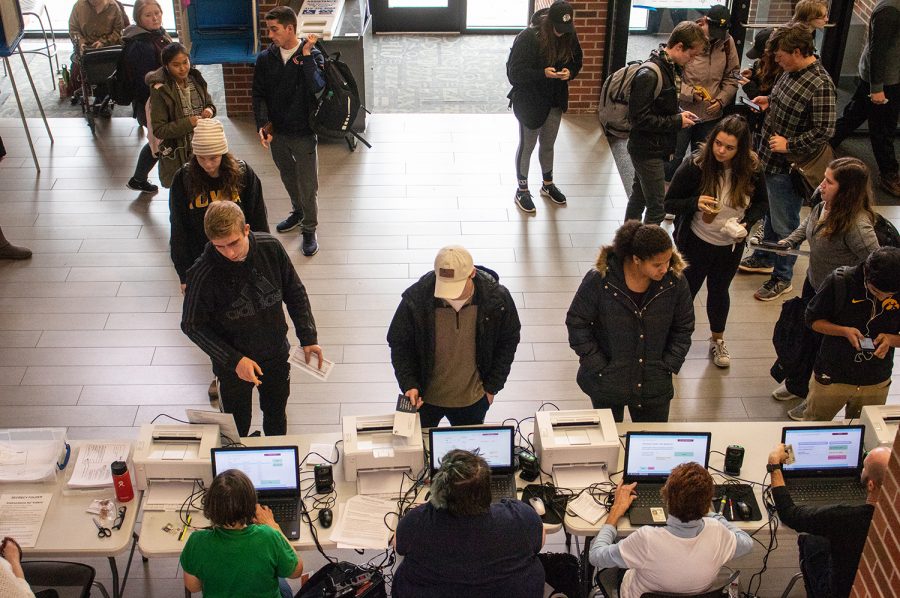Opinion: Voter suppression should be a top target of Iowa Democrats
The electoral process still discriminates against African Americans, something the Democratic Party should work to correct.
Voters wait to vote at the University of Iowa Library.
February 16, 2020
February is the shortest month of the year. It’s also a month where American history is measured by what has been accomplished, and what is yet to be achieved.
The first four presidential caucuses and primaries are held. Black History Month recognizes and celebrates the fight for civil rights, and the power of figures such as Harriet Tubman, James Baldwin, and Rosa Parks.
This month is a complex bookmark of time, where the history preserved is studied, and what the future implies is envisioned.
Iowa Democrats — and white Democrats — in particular are measuring this time, but in ways that ignore the present obstacles for millions of voters who have sought civil rights in this country long before its founding.
With voter suppression against black communities still strong, white Democrats must do better to apply the celebrated narratives American history to the present.
The birthdays of President Abraham Lincoln, as well as abolitionist writer Fredrick Douglass, founded the origin of Black History Month. Lincoln’s administration and Douglass’ rhetoric were obviously monumental for the civil rights of black Americans. Slavery was abolished. The social movement of abolitionism in the North began to try to change the macroaggressions toward African Americans.
But change is often but a barely disguised evolution. This evolution is something white Democrats seem weary to fully acknowledge — let alone rectify.
Slavery became the 13th Amendment, which holds a preposition redesigning slavery: “Neither slavery nor involuntary servitude, except as a punishment for crime whereof the party shall have been duly convicted, shall exist within the United States.”
Little more than a century later, this became mass incarceration. The U.S. has roughly 4 percent of the world population, but nearly a quarter of the world’s incarcerated people, according to the International Centre for Prison Studies. Within our country’s prisons, black Americans are disproportionally represented five times over. Convicted felons, no matter the crime, cannot vote in most states.
The gross irony is fully there.
Iowa’s own prison population has tripled in the last two decades, according to the Prison Policy Initiative. Even though only 3 percent of Iowa’s population is black, the group makes up a quarter of the state’s prison inmates. That means thousands of black men and women who could not participate in the Iowa caucuses because of a conviction status.
During a month in which the fight for basic rights for an entire people are honored, America is still actively denying those rights for black Americans today.
Even when putting the effects of the 13th Amendment aside, voter suppression persists in ways most Iowa Democrats fail to realize — little has changed.
Conviction and citizenship aside, there are still so many obstacles directly impacting the voting rights of African Americans.
Take voter-ID laws. They may seem like a logical approach to participating in an election, but they inevitably present disadvantages. The process of acquiring an ID takes time away from work shifts, or taking care of a home. They cost money. A major demographic of Americans — much of which are, once again, disproportionately black Americans — cannot afford these laws.
Even Election Day itself is not a holiday. This fact too presents the same kinds of disadvantages within a system that should exist for Americans to vote for progress, and for positive change.
While the white Democratic candidates have acknowledged the existence of racism in our political system, voter suppression must be focused on everywhere. Especially in Iowa, where presidential elections are a cornerstone of the state’s 86 percent white identity.
These politicians and their supporters have the agency to challenge the many forms of voter suppression, starting here in Iowa.
To only use Black History Month as a topic in self-appealing conversations between Democratic-voting white Americans is a conviction of indifference.
Ignoring voter suppression in this election is a major offense to the centuries-long fight for civil rights. White Democrats are comfortable in a system that upholds the same components of segregation Lincoln and Douglass, Baldwin and Parks worked against.
These efforts cannot be seriously celebrated by a demographic who only looks back to past victories, and is severely lacking in fighting the issues that remain today.
Progress that undoes voter suppression must be made. Comfort must be left in our history, and never returned to.
Columns reflect the opinions of the authors and are not necessarily those of the Editorial Board, The Daily Iowan, or other organizations in which the author may be involved.





